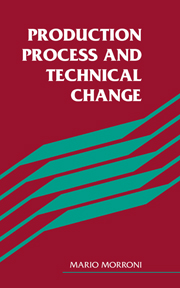Book contents
- Frontmatter
- Contents
- Acknowledgements
- Introduction: scope and outline
- Part 1 Basic concepts and hypotheses
- Part 2 The model and its application
- 5 Introduction
- 6 Production as a sequential process
- 7 The matrix of production elements
- 8 Transformation of the matrix of production elements for empirical research
- 9 Towards empirical implementation: some case studies
- Part 3 Economies of scale, economies of scope and production flexibility
- References
- Index
9 - Towards empirical implementation: some case studies
Published online by Cambridge University Press: 03 February 2010
- Frontmatter
- Contents
- Acknowledgements
- Introduction: scope and outline
- Part 1 Basic concepts and hypotheses
- Part 2 The model and its application
- 5 Introduction
- 6 Production as a sequential process
- 7 The matrix of production elements
- 8 Transformation of the matrix of production elements for empirical research
- 9 Towards empirical implementation: some case studies
- Part 3 Economies of scale, economies of scope and production flexibility
- References
- Index
Summary
Preliminary methodological considerations
In the introductory chapter on scope and outline of the book I emphasized that one of the main aims is to present an analytical scheme which can be used for the applied research of production processes and the transformations undergone by production units and industrial sectors. The first step in assessing the scheme's suitability for this purpose is to apply the quantitative matrix and the organizational scheme to the analysis of some case studies. This will also be useful for expository purposes, inasmuch as the numerical examples may facilitate comprehension of the model's characteristics.
As mentioned, the fund–flow model does not yet seem to have been used in empirical analysis. In applied studies the effects of technical progress have been examined mainly through the estimates of the production function, or through data on R&D expenses and patents, or through interviews with firms.
Empirical studies, based on econometric estimates of the production function, often assume mathematical properties of functions that do not fit the characteristics of the techniques which are relevant for evaluating the economic effects of technical change. Furthermore, these studies consist in a purely quantitative representation of the production process, ignoring the effects of the relationships between the time profile of the production process and the organization of labour on the size of the production unit. This representation therefore has to be ‘supplemented’ by means of other analytical tools.
- Type
- Chapter
- Information
- Production Process and Technical Change , pp. 99 - 134Publisher: Cambridge University PressPrint publication year: 1992



